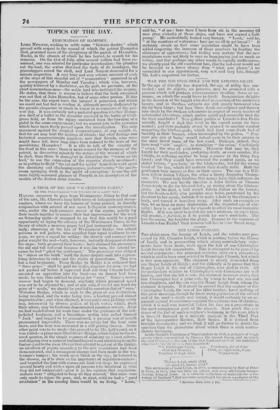WAR FOR THE COAL-HOLE AND THE KITCHEN-GRATE.
IF the age of chivalry has departed, the age of utility has suc- ceeded ; and its objects, we perceive, may be promoted with a passion which will produce extravagancies rivalling those of ro- mance, on which the world loves to dwell. Imagination delights in the devotion of the knight who died in assertion of his mistress's beauty, and in theatres subjects are still greatly honoured who (lie for their kings ; but how these deeds are eclipsed and thrown into shade by the modern vehemence in respect of every species of substantial advantage, which makes quiet i and peaceable men die for their coal-holes ! Two gallant youths of Lincoln-s-Inn Fields actually fought a duel this week in the sacred cause we have named ; and were probably about to proceed to another combat respecting the kitchen-grate, which had fired some fresh fuel or hostility in their breasts, when interrupted by the police. " Pug- nare pro aris et focis," would indeed seem to be their maxim in the most literal sense of the last word. Perhaps, indeed, they have read " aris " an1r70, as signifying " the areas," Cockaignly " airy s ," the sites of coal-holes. However that may be, they fought for their coal-holes, preferring death, or even murder, like Othello, to suffering another to keep a corner in the; thing they loved ; and they would have renewed the combat again, as we stated before, " pro focis," or the kitchen-fire, but for the strong hand of the law, which did restrain their deadly strife. Both the gentlemen bear names as fine as their cause. The one is a Wil- liam Edwin Julian Villiers, the other a Henry Augustus Thomp- son. We cannot help thinking that names have their influence on character. We can hardly imagine a John Dobbs or Thomas Jones ready to die for his coal-hole, or raging about the kitchen- grate. In the duel, a ball struck Edwin Julian on the breast ; but the heathen deity who presides over holes, penetrated by his devotion to her cause' forbade it to make a hole in the champion's body, and turned it harmless away. After such an example as this, let us hear no more deploration of the departed age of chi- valry: here is a spirit that far exceeds in effect its most romantic flights. If it was great to perish for one's mistress, or one's king, still greater, a fortiori, is it to perish for one's coal-hole. The less the cause, the brip,ixter the glory. Honour to the warriors of Lincoln's-Inn Fields! their renown will live in Dow Street story.


















 Previous page
Previous page